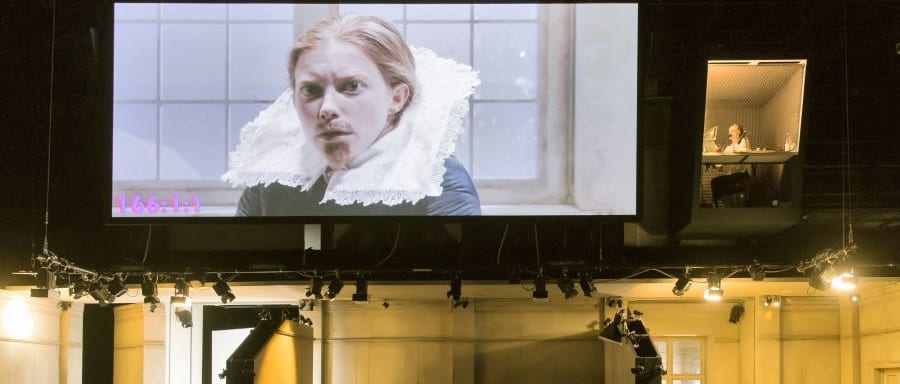Screens both on your left and on your right, intertwined by a treadmill for cameras. A recording studio, all lit up. More cast than crew on a stage split in various rooms for leisure activities. On the top left corner – a studio that is the origin of the upcoming narration: An omnipresent biographer reads and creates the story of Orlando – the most truthful creature of either sex ever established by the great mind of Virginia Woolf.
Grown up an androgynous young Englishman in the late 16th century, Orlando’s interest unite both the contemporary male and female pleasures. The impression comes off as one of a man; However, his expression bound to writing does not accommodate as easily to his social environment. The loss of virginity triggers the neglect of his first mistress as well as the denial of interest in nature and passion for writing. Or does interest for parties, alcohol and the desire for intercourse in general accrue from deflowering? Is becoming a nobleman indifferent to growing out of the shoes of an inspired but virgin soul? How do you cope waking up with a different sex when you were just about to balance your inner desire and the outer expectations? Whom do you serve with your own being – Does one have to be obedient to society or serve one’s very own mindset instead? To whom do you write? For whom do you want to pair off paper and ink? As a diverse pseudonym, taking on both characteristics of a decent Elizabethan woman as well as spreading the royal arrogant flair of a gentlemen, Orlando adapts to every place, culture and event he attends. The character questions gender in a recurring stream of consciousness. One thing she reveals is her surprise at which ease one becomes a victim of social conventions and is therefore able to fit in at ease.
Reversed reflections of nature, body and soul on screen surround the footage taken during the performance. Parallel to Orlando’s very own path of life, the setting functions as a template to derive the multidimensional ambiguities of sexes and diversity throughout his and her journey. Along the lines, faces in a close-up are usually not seen in a theatre. An audience that expects nothing but a classic show performed, will experience details no one – even the ones in the first row – ever get to see. Eventually, the real perception of sexes displayed in fiction will lie in the eye of the beholder.
The silliness of confusion between the sexes is similar to Tilda Swinton’s performance in Sally Potter’s film adaptation. Through the speed of changing scenes, this show becomes a queer mashup needed in times of coexisting narrow mindsets of strict conventionalism when it comes to heteronormativity or the obstinate exposition of free love.
Woolf’s representation of Orlando equals a feminist foresight of a soul that inherits a character and a body that is either meant to follow societal constructions or is resilient to be restricted to female or male norms. In the end, when one is asunder, it all still comes down to one thing: We are rooted, but we flow.

